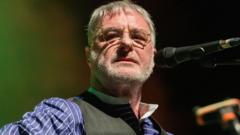5 hours ago
About sharing
Steve Harley, the frontman of British rock band Cockney Rebel, has died at the age of 73.
His best known song was Make Me Smile (Come Up and See Me) which went to number one in the charts in 1975.
The musician had still been touring until recently, but cancelled dates to have treatment for cancer.
His family said Harley had “passed away peacefully at home”, adding: “We know he will be desperately missed by people all over the world.”
London-born Harley lived on the Essex-Suffolk border with his wife Dorothy, with whom he had two children, Kerr and Greta. His family were by his side when he died.
“Whoever you know him as, his heart exuded only core elements. Passion, kindness, generosity. And much more, in abundance,” Dorothy, Kerr and Greta wrote in a statement.
“The birdsong from his woodland that he loved so much was singing for him. His home has been filled with the sounds and laughter of his four grandchildren.”
Tributes have been paid to Harley from across the music industry. Singer-songwriter Mike Batt, who worked with Harley on many songs, described him as a “dear pal” and “lovely guy”.
“What a talent. What a character,” he wrote on X, formerly Twitter. “My condolences to Dorothy and all. RIP, mate.”
The duo worked together on tracks including Ballerina (Prima Donna) released in 1983 and the 1988 charity single Whatever You Believe, in which they were joined by Yes lead singer Jon Anderson.
Ultravox frontman Midge Ure, who produced Harley’s 1982 track I Can’t Even Touch You, said he was a “true ‘working musician'”.
“He toured until he could tour no more, playing his songs for fans old and new,” Ure wrote on social media. “Our songs live on longer than we ever can.”
Harley was born in south London in 1951 and formed Cockney Rebel in the early 1970s.
The original band was made up of Harley, Jean-Paul Crocker, drummer Stuart Elliott, bassist Paul Jeffreys and guitarist Nick Jones.
Their debut studio album, The Human Menagerie, was released in 1973. Other hits include Here Comes The Sun which was released in 1976.
Harley also presented Sounds of the 70s on BBC Radio 2 between 1999 and 2008.
Helen Thomas, head of Radio 2, said everyone at the station was “saddened” to hear of the news. “We send our condolences to his family and our presenters are paying tribute to him on air,” she said.
In December, Harley wrote on his official website that he was “fighting a nasty cancer” for which he was receiving treatment.
He said the first half of 2023 had been “magical” as he got to tour in Europe with his band members, adding: “Out there, on the road, that’s where I come alive”.
But the second half had been “heartbreaking” as the band was forced to cancel live show dates after his diagnosis.
“It’s tiresome, and tiring. But the fight is on,” he wrote. “And thankfully the cursed intruder is not affecting the voice. I sing and play most evenings.”
But a post on his website last month said: “Due to ongoing treatment for cancer, Steve cannot commit to any concerts in 2024.”
